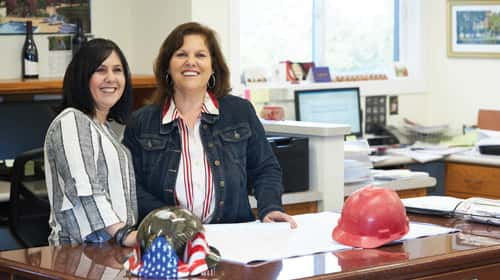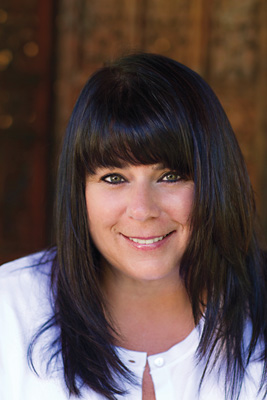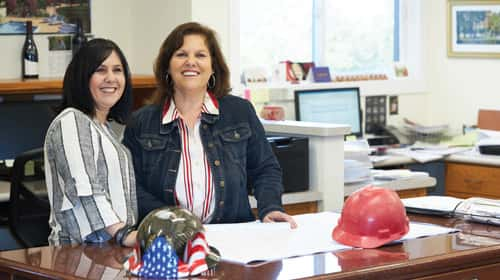When women take on leadership roles in occupations previously restricted to men, professionalism and passion helps them excel in a male-dominated industry.
The sight of women in hard hats on construction sites or kneeling on rooftops was once unthinkable. Not so long ago, their position in the building trades was strictly limited to the office, while hands-on occupations and leadership were the exclusive domain of men. Today, though, women are proving that they’re more than up to the task of running successful construction companies, where they demonstrate that knowledge, skills and business savvy matter more than gender.

Natural progression
Nancy Eddinger Madarus, president and chief executive officer of Eddinger Enterprises Inc., in Healdsburg, didn’t expect to make a career in her family’s construction business, when she was young. “I remember being about 12 and coming home from helping with a concrete job. My hands were sore and cracked from the cement and stripping forms,” she recalls. “I walked into our family kitchen and announced I would never work in construction.” Nonetheless, she continued being part of the action, tagging along with her dad, Jerry Eddinger, and working in the office after school and during the summer when she was in high school. She even had the opportunity to do project management in a subdivision when she was a teenager, and discovered that the work was always interesting and never boring. Every day was different, and she got to be outside and see the seasons.
After earning a degree in marketing from Santa Clara University, she returned to Healdsburg and started learning every aspect of the business in earnest. In contrast, her sister Susie Eddinger Cavallo, seven years younger and now vice president, always assumed she’d build a career at Eddinger Enterprises. She started washing trucks and cleaning up job sites when she was about 12, and then she moved on to work at Healdsburg Paint Center when she was 15. At 16, she got job at Pacific Plumbing, where she received training in office work, accounting and plumbing parts. Later, after college at Santa Rosa Junior College, she too returned to the family business, following in the footsteps of her sister. “She enjoyed it, made it look fun, and I wanted to be part of that,” says Cavallo. Now 48, she is a licensed plumbing contractor and oversees the company’s plumbing, including some design. “I love helping to pick put fixtures to match our customer’s style and taste,” she says. Madarus, 54, is a licensed general contractor and shares project management duties with her father.
Mary Lou and Jerry Eddinger started the business in 1968, when Madarus was just 4. At first, they ran it from the house and worked nights and weekends, but family time was also important, and the girls wanted to spend time with their dad, so he took them along on jobs. As they grew older, he became their mentor and encouraged them, paving the way for them to enter the business. As they grew up, developing their skills was primary, and whether they were male or female wasn’t an issue. “Jerry took me early-on to meetings and job walks, introduced me, and I made sure I was well prepared,” says Madarus. In retrospect, she believes his clients and business associates thought that if he trusted her, they could, too. “He and his contacts gave us a chance, and we used our knowledge and confidence to do the job right once we were involved,” she explains.
Madarus and Cavallo also had strong female role models. Their grandmother, Rose Pavoni, owned a restaurant and catering business, where everyone in the family, including Jerry, worked, and later, their grandmother, mother and aunt had a women’s clothing store. Mary Lou also did the bookkeeping and billing for Eddinger Enterprises, and the women in the family trained Madarus and Cavallo in money management and careful budgeting. “I think that’s one of the reasons the company is so strong,” says Madarus.
Their own initiative was also key. “We work for Eddinger Enterprises,” says Madarus, and that means they’re working under Jerry Eddinger’s license, which goes back to the 1970s. However, they wanted their own licenses, and so they spent several months taking classes and successfully passed the required tests. Cavallo earned a plumbing contractor’s license, and she had to answer in-depth questions specifically about plumbing, while for her general contractor’s license, Madarus gave answers to questions about all the different trades. In addition, they took classes in law and businesses practices and studied codes. It was a small class, and though they were the only women, they felt comfortable. “It definitely wasn’t intimidating to us,” she recalls.
Cavallo adds that gaining acceptance hasn’t been too difficult for her, because she spends more time in the office than on job sites. “Plus, my sister paved the way, so no one really ever gave me a hard time,” she says. “Our clients have always been receptive and seem to value our input and opinion.”
Family ties
Working in the sheet metal business came naturally for Barbie Simpson, whose parents, Bill and Nancy Simpson, started Simpson Sheet Metal in Santa Rosa in the 1980s. Simpson is now owner-president of the company. “I love what I do. There’s no place I’d rather be,” she says. “I feel very, very lucky that my mom and dad started this.” She started doing basic office tasks when she was 15, but when she was in high school, she was undecided about what to do after graduation. Simpson attended Heald College to study accounting. When she finished, she returned to the family business, where her mother, who managed the office, became her teacher. “She was definitely a role model. She taught me everything,” she says.
 According to Simpson, her mother instructed her little by little, and when she mastered one skill, they moved on to the next. “One time we built a house, and I helped with the rough-in on the house,” she says. “That was my first [lesson] about residential work and how it all fits together.” When she was younger, she also started going out to jobs to see what the workers were doing, and she still visits job sites on a regular basis. “I’ve had to learn everything we do to make good decisions,” she says. “I’ve worked here my entire life. I know every facet of the business.”
According to Simpson, her mother instructed her little by little, and when she mastered one skill, they moved on to the next. “One time we built a house, and I helped with the rough-in on the house,” she says. “That was my first [lesson] about residential work and how it all fits together.” When she was younger, she also started going out to jobs to see what the workers were doing, and she still visits job sites on a regular basis. “I’ve had to learn everything we do to make good decisions,” she says. “I’ve worked here my entire life. I know every facet of the business.”
Her mother’s guidance was crucial, but Simpson also got plenty of encouragement from her father. “My dad was someone who honored and respected women. He was the guy who, since I was 16, came into the office every day and gave me some kind of a little pep talk,” she says. Plus, he believed in her ability. “My dad respected women and what they brought to the table in a huge way,” she recalls. When he passed away in 2009, her mother became the owner of Simpson Sheet Metal, and then Simpson followed her as the current owner and president. She didn’t know what to expect, or how people would react when she took over but was gratified to get a positive reception. “I get amazing feedback from people,” she says.
She recently earned Woman Owned Small Business certification, and as part of the process, she had to get references. “I got some from key people in our community,” she reports. She believes that it’s the result of providing a valuable service and building relationships. “I love dealing with our customers,” she says. Today, she has a new office that puts her right at the front door, so she can greet them when they come in. And one of her favorite parts of the business is her employees. She has 70, and knows their needs, what they do and what makes them tick. “To be successful, you have to have a relationship with your employees,” she says. “We’re in a growth mode right now,” she says, and she’s hired a dozen new workers. When someone starts, she always takes time to explain the basics. “We have an amazing team,” she says.
Moving up
Letitia Hanke, chief executive officer of ARS Roofing and Solar, started from scratch and didn’t have the support a family business provides. She did, however, have the drive, resourcefulness and eagerness to learn that is the mark of successful women. When she got her first job in the roofing industry, it was out of necessity. She was in her junior year as a music major in recording and performing arts at Sonoma State University, working three jobs, as well as going to school. “I got into the business because I was broke. I wanted to have one good paying job,” she says. She found work as a receptionist at a roofing company, left school, and a year-and-a-half later, the office manager left, and her boss offered her the position. She accepted and kept moving up, becoming a company supervisor.
The owner of the business trained her in all aspects of the business, including hands-on roofing, and while she enjoyed working in the field and being outside, the manual labor was difficult. In addition, although most of the male crew members were nice, some made sexist remarks that made her uncomfortable. When the owner started making plans to retire, he asked if she would like to buy the company. She didn’t, but she knew how to run a roofing company and wanted her own business. She had good ideas, which her boss always shot down, and a fresh start with her own company would give her the freedom to implement them. When the business closed, she started ARS Roofing—Alternative Roofing Solutions Inc.—and has been the CEO for almost 15 years, making it nearly 24 years in the industry.
At the outset, Hanke, 43, decided to take a professional approach and not cut corners. “I knew if I was  going to go into business, I was going to be legit,” she says. She made sure the company was bonded, licensed and insured and ensured her employees would have Workers Compensation. She also earned her contractor’s license. The roofing part was easy, but she found the law component more challenging. “I got through and passed it,” she reports. On reflection, she observes that operating a business came naturally. “I like that I was the only female. That was kind of exciting to me.”
going to go into business, I was going to be legit,” she says. She made sure the company was bonded, licensed and insured and ensured her employees would have Workers Compensation. She also earned her contractor’s license. The roofing part was easy, but she found the law component more challenging. “I got through and passed it,” she reports. On reflection, she observes that operating a business came naturally. “I like that I was the only female. That was kind of exciting to me.”
It wasn’t all smooth sailing, however. In the beginning, she signed her name with her initials so that she’d blend in, and gender wouldn’t be an issue. Then, she had an experience that changed her perception. A couple who wanted a new roof called her, and they developed a great rapport over the phone. They liked the bid and price range and were ready to move ahead, but first they needed to see samples and choose a color. When she delivered the sample board to their home, the woman opened the door and gasped. Then, when the man joined them, Hanke introduced herself and extended her hand, but he refused to shake it and left. The wife went over the bid briefly with her and said they were rethinking their decision to reroof.
Then, as she was leaving, the man reappeared and told her, the house had an alarm system and if anyone tried to break in, it would go off really loud. She realized as an African-American woman, she had another hurdle to overcome, and went around the corner and cried. She told her employees about the incident and shredded the contract. From that point on, she signed her full name and put her face on everything. “I decided no longer to hide,” she says, explaining that now people know she’s an African American woman a woman who owns the business. “It made me stronger. My perseverance is what’s made me successful.”
Sharing wisdom
Today’s female business leaders are breaking new ground and have some sage advice for younger women who would like to enter a male-dominated field. Cavallo and Madarus advise them to be passionate about what they do and put their all into it. Learn from and listen to those who have been at it longer, pay attention, and keep learning. “You shouldn’t get or give up any opportunity because you’re a woman. Prove that you’ve got what it takes, and good things will follow,” says Madarus.
Simpson believes that if a woman is interested in a particular occupation, she should pursue her interests. “You can’t let anything stop you,” she says. Hanke adds, “When things get tough, just hold on; stay in there. It’s not going to be easy, but what’s going to happen is that if you stick with it, good things will come.” She also suggests that if you have a successful business, find something that’s meaningful to you and give back.
Women bring a quality of balance and inclusiveness to an industry that’s previously been dominated by men, and they’re generous when it comes to helping others. When Hanke’s son was in second grade, she started giving 1 percent of the price of every reroofing job to a school of a client’s choice. After three years, she discovered that she could receive grant funding and do more if she established a nonprofit, so she founded the LIME Foundation, which finds ways to alleviate medical conditions such as heart disease and diabetes. She also created the Turner Arts Initiative, a six-week summer program, where students can explore the arts, and the NextGen Trades Academy, which helps women get into nonconventional industries and introduces students, male or female, to the trades when they can’t figure out what they want to do. “As they get out, contractors are scooping them right up,” she says. “My dream has always been to give to others.” (Turner is her maiden name.)
Simpson served on the board of the Career Technical Foundation Sonoma County, which provides funding for North Bay Construction Corps, a partnership of North Coast Builders Exchange and the Sonoma County Office of Education. She also speaks to people interested in exploring the trades, addressing groups going through Construction Corps programs, and inviting students interested in exploring the trades to visit her business. “I’ve hosted them in the shop,” she says. The groups perform hands-on projects, which Simpson oversees. Cavallo and Madarus contribute to their community in the belief that they live, work and socialize in Healdsburg, and residents of the city are part of their extended family. Among their favorite projects are Plaza Gazebo, the Little League building and Clarence Ruonavaara Grandstands at Rec Park. “These buildings make people happy and bring them together,” says Cavallo.
Family is important, too, and members of a younger generation are entering the construction business, perhaps because they’ve grown up around it, so it’s part of their lives and seems normal. Among them are Madarus’ son, Joe, and Simpson’s daughter, Sara, who’s following her mom’s path, starting in the office and learning one thing at a time. It’s still unusual to see women in the construction industry, but it’s becoming more common, and as one generation passes on knowledge to the next, ability, not gender, is most important. It’s a new perspective that ensures an industry’s leaders are the best, making the future bright and promising.
Women-Owned Small Business Certification
The federal government’s goal is to award at least 5 percent of all contracting dollars to small businesses owned by women in fields where WOSBs (women-owned small business) are underrepresented. Some awards are also restricted to WOSBs that are economically challenged. To compete for contracts, the businesses must be certified. For a company to earn certification, women must be U.S. citizens, and own and control at least 51 percent of the business. In addition, they must manage day-to-day operations and make long-term decisions.
To learn more about certification, go to certify.SBA.gov.
National Association of Women in Construction
The National Association of Women in Construction holds Women in Construction Week each year to put a spotlight on the important role that women play in the industry. It’s an opportunity to raise awareness of opportunities for women and highlight their contributions, as well as a chance for local chapters to give back to their communities. This year, it took place from March 3 to 9.
Learn more at www.nawic.org.
Women in the Trades
The following sample from the U.S. Department of Labor Statistics shows the percentage of women in nontraditional occupations in the building trades.
Occupation Women as a percentage
Roofers 0.5 percent
HVAC 1.2 percent
Pipelayers, plumbers, 1.6 percent
pipefitters and steamfitters
Carpenters 1.7 percent
Operating engineers 1.8 percent
and other construction
equipment operators
Structural iron and steel workers 2 percent
& steel workers
Drywall installers, ceiling tile 2.1 percent
Installers and finishers
Carpet, floor and tile 2.3 percent
Installers and finishers
First-line supervisors of 2.4 percent
construction trades and
extractions workers
Electricians 2.4 percent
Helpers, constructions trades 4.7 percent
Sheet metal workers 5.2 percent
Painters, construction and 6 percent
Maintenance
Architectural and 7.6 percent
engineering managers
Cabinet makers and 9.9 percent
bench carpenters
Construction and 12.2 percent
building inspectors
Note: Nontraditional or male-dominated occupations are those in which women represent 25 percent or less of total employed. Occupations include those with a sample size of at least 50,000 people employed.
Source: Bureau of Labor Statistics, Current Population Survey
www.dol.gov/wb/stats/Nontraditional%20Occupations.pdf





